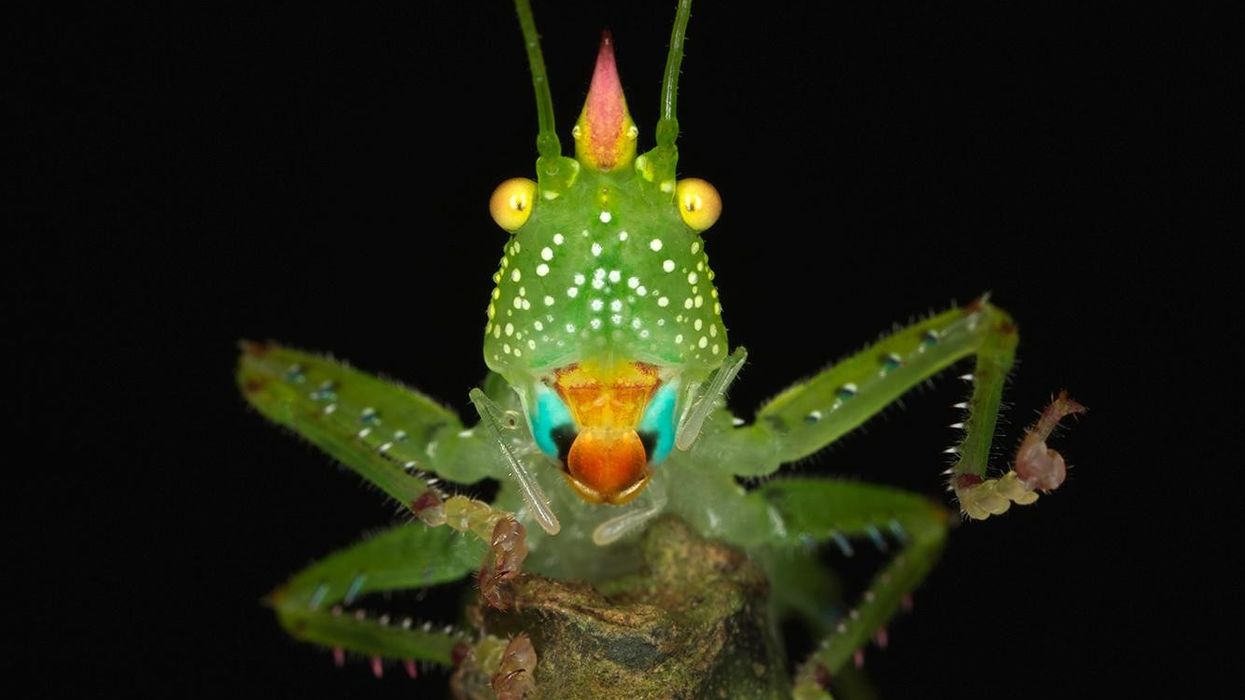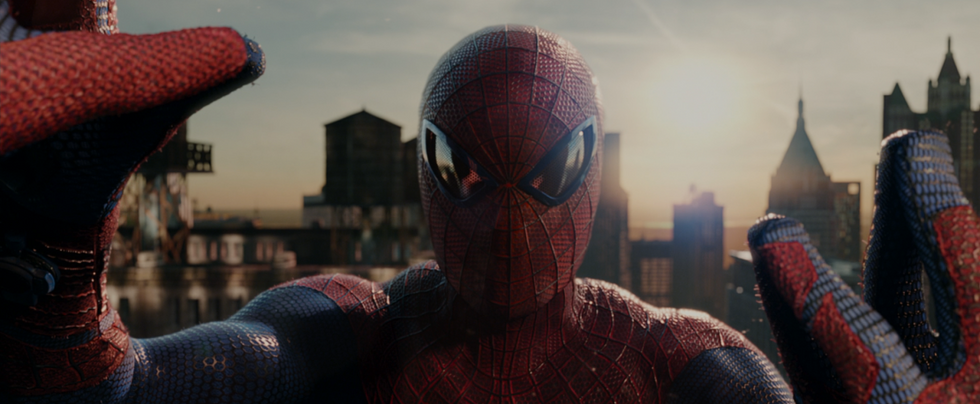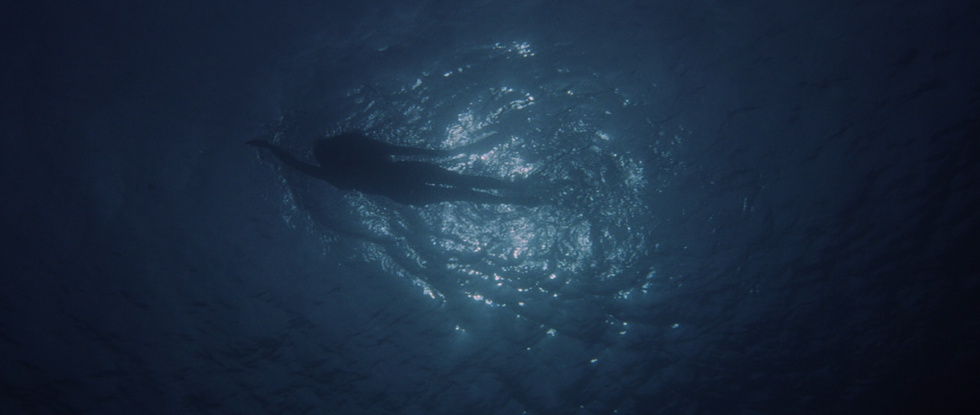Filming the Tiniest Things on the Planet to Show the Big Picture in Macro Doc 'Learning to See'
You've never seen insects quite like these.

Documentary filmmakers are a crazy lot. Jake Oelman traipsed through the jungles of Colombia as a one-man-crew following his father, macro photographer Robert Oelman, on a quest to discover the most outrageous flying, hopping, stinging, and exquisite insects of the Amazon. Learning to See magnifies a world we’ve never seen before, and through Jake’s portrait of his father, makes us care about that world’s continued existence in the face of humankind's increasingly harmful influence.
No Film School sat down with Jake and producer Jerry Aronson (Chasing Ice) to talk about the making of the macro doc.
"Editing documentaries is like writing and editing at the same time."
NFS: The main subject of the film, Robert, is also your father, so you've know him all your life. When did you know he would make a great subject for a documentary?
Jake Oelman: I got the idea a long time ago, probably around 2005. My dad had moved to South America in 1993. He left his psychotherapy career behind and just started something completely new. He didn't speak the language. When people would ask me what my dad did, I would tell them that and there's something really interesting about a person who takes on such a dramatic change and can really conquer their fear to do that.
Never did I think that it was going to be about insects, or that it would be focused on photography, but as the idea progressed and as he started progressing in his photography, it naturally became this very beautiful nature documentary; a man's life transition. That was the nucleus of it, just being inspired by change.

NFS: Your dad is an ace macro photographer. In following him, you had to shoot both him and these tiny insects on a completely different scale. What were the practical sides of capturing this macro world on video?
Oelman: It's somewhat of an interesting process because he photographs most of the insects in his studio, whether the studio is inside or outside. Because I was [making the movie] as a one-man band, I really tried to employ a 360 degree tactic. I was making sure that I had wide shots, making sure that I had ample coverage on him for sound bytes. Discovering moments.... seeing his face when he is seeing something for the first time. I think that was very important.
Being able to punch in and get those macro shots that were going to complement his photography was hard. [The photographers] work very systematically. It's one after the other after the other. I have to slip in [the studio], switch on my macro lens, and get tight. Sometimes I have a little more time with the subject; sometimes I have a little bit less. Fortunately, using that 360 degree tactic, I was able to capture it all. The macro stuff came out fairly well; it was my first time shooting any kind of nature footage, and it's really challenging at first. It was a big learning curve for me, from a cinematic as well as from a story standpoint.
"When people hear 'insect,' they're not thinking of what we're seeing in the film; they're thinking of household pests."
NFS: It was just you, your one-man band, shooting everything?
Oelman: Yes, basically. Everything and all the B-roll stuff in the forest, the macro shots, all that was all me. When I got down to doing interviews, then I could actually bring my other DP, who has a lot of experience doing that. He and I went to college together. For that portion of it, I had help, but really when I was in the forest it was just myself doing everything. It was a lot of humping gear around through the forest at night and during the day.
NFS: What's the essential one-man band gear you need to have trekking through a Colombian a jungle?
Oelman: I had a GoPro for some stuff. I think GoPros are actually really great when you're traveling because you're going through customs and you can't afford to have all your heavy gear out ready to shoot. I had the GoPro for that kind of stuff, and then I had my Panasonic AF 100, and I shoot everything on prime lenses so I didn't have any zooms at all. Which is kind of a difficult choice, but I like the way primes look versus zooms; it kind of forces you into certain perspectives. I shot some things on a little digital still camera and I would switch it over to video mode, really just trying to get as many things as I could. You're only there for a certain amount of time, and you don't know when you're going to go back, you don't know what you're going to see, so you're just trying to capture everything. That was my shooting style.

As much as it was a one-man band, I didn't want to make it feel like a one-man band.
NFS: I like it! I couldn't help noticing that there's a bunch of tracking shots. And is there some drone footage?
Oelman: There's a little bit of a drone, and then there's also slider. I brought a slider with me — a pretty compact slider unit — as well as the tripod I had. As much as I could, I would try to set up the slider to give it that little extra production value. As much as it was a one-man band, I didn't want to make it feel like a one-man band.
NFS: How did you meet Jerry? How did you collaboration begin?
Oelman: Jerry and I met almost twenty years ago. He was my thesis advisor when I was at the University of Colorado making my thesis film. We had stayed in touch over the years, and then in 2012 when I was really ramping up the production on this, I watched Chasing Ice on Netflix, and I saw Jerry's name and was like, "Aw man, I'm doing something that has a lot of the same themes, and a lot of similar subjects in a lot of ways." I thought he would be the perfect person to talk to and bring on board for the project because we had an existing relationship and he has such a great track record and career in doing documentaries. It just felt like a perfect fit and very organic, so I called him and I sent him my stuff and he said yes.
Jerry Aronson: It was interesting, because it's really the same way I got involved with Chasing Ice. I just grew tired of teaching at CU; I'd been there 34 years. I was basically producing thirty student films a semester, which didn't leave a lot of creativity in me. I think I am going to retire now and make movies.
So, Jake calls, and I said, "Please send me something," and he sent me his dad's incredible photographs. I realized that, number one, this movie [and Chasing Ice] were both really films that were about what mankind is doing to the planet in different ways. Chasing Ice is very large scale, but the insects are the exact opposite. We don't see them even, and we kill them, and they're the bottom of the food chain. Number two, I really trusted Jake's ability to make a film. Number three, the photos were beautiful, so how could I say no?
He came out for three weeks to my house in Boulder. We brought out a bunch of footage and we started structuring it. It was already somewhat structured, but my real ability seems to be in telling a story. I got a writer credit as well as a producer credit. It was about figuring out the relationship between Jake and his dad, versus Robert's growth from a psychologist. I know Jake said this, but it was an outside perspective. I'm not related to his dad, so I could ask questions to his father that were a lot deeper in a way, and a lot more probing.

"I really focus on my subject and I really look them in the eyes. It's an interview, but without questions, it's just a conversation."
Oelman: I had been doing interviews throughout the process and I was getting good bytes, but I didn't have a breakthrough yet. A lot of that was just attributed to the fact that my dad was viewing me as his son, which is totally normal. I knew that if I could get my dad out to L.A. and put him in a studio, and have Jerry come out and interview him.... Jerry [was great for this], not only given his experience, but given that they have similar life experience and came up in the same era, the breakthrough is much more likely to happen, and that's exactly what happened. Every interview afterward that I did with my dad was a totally different experience. He was much more open, he was much more willing. I really have to thank Jerry for that because had he not done that interview, I don't think my dad would have had that breakthrough and ultimately the film wouldn't have worked. Fortunately for us, it all came together.
Aronson: It was pretty extraordinary. [Robert and I] spent one day together, and we basically got drunk together. Whatever it takes to loosen people up. He was telling me all kinds of things that I remembered carefully, and then the next day when Jake had set up this beautiful set for the interview I just came on the set and sat down, and Bob could not see Jake or anybody, they were pretty well hidden. I just started and within like three hours, and while I didn't mean to, he was crying and I looked over to Jake and he —
Oelman: I couldn't believe it.
Aronson: It's because I'm a different person, and I was asking him questions based on what he had told me privately, drunk. I've interviewed a lot of people in my time, and I just know how to do it. My students used to say, "Shhh, Jerry's in his interview mode." They'd go, "You're a different person." I really focus on my subject and I really look them in the eyes. It's an interview, but without questions, it's just a conversation.
Anyway, it worked and it was fantastic and he had so much footage. We were trying to shape the footage. Editing documentaries is like writing and editing at the same time, it's so hard to structure it to tell the story.
Oelman: Much different than a narrative, for sure.
Aronson: Well, there's no truth to follow. The film has to reveal itself.
"The best stuff will come out of failure, so making mistakes is really the key."
NFS: It's interesting when you talk about the similarities of Chasing Ice to this film, since one is about large scale glaciers, and the other is about the tiniest of insects. But both are ultimately about showing us the human impacts on the rest of the planet. How do you make your film effective in terms of taking away a message?
Aronson: Robert is very soft spoken. He's a photographer; he doesn't give lectures. To get him to open up and to really talk about the things he talks about... again, after the interview he was all of a sudden from the heart. I think in this film specifically, and I love doing films like this because I learn, I learn so much. I didn't know that these things are a millimeter! To see them on the screen the other day, 70 feet across, Robert was blown away!
Oelman: Yeah, he was!
Aronson: We had never seen them that big, and to hear the audience gasp — one hundred and ninety people gasped. It was like, "Whoa!" This is working.
Oelman: Insects have this stigma.
NFS: People want to squash them.
Oelman: When people hear "insect," they're not thinking of what we're seeing in the film; they're thinking of household pests. If you're going to try and create empathy for insects, you really have to have empathy for the main character, in this case being Robert. He is really the vehicle, and him having that breakthrough and opening up about his story, and how childlike he gets when he discovers something or sees something new for the first time. That was really the way to get the audience to appreciate what they're seeing, the same way Robert appreciates what he is seeing. He really does care a lot about the subjects, and it's not just insects; it's all animals, it's all nature. That was an important distinction to make because if we were going to just make an insect movie, it would be a much different thing.
Aronson: I don't think I ever said out loud, but Robert is kind of the insect whisperer. He holds them, talks to them. That was great footage. It really showed you that connection.
NFS: Do you have any advice for doc filmmakers just starting out?
Oelman: The best stuff will come out of failure, so making mistakes is really the key. From a feature film standpoint, you just have to be extraordinarily resilient, extremely dedicated and you just have to love it. If you don't love it, you are screwed. It's too hard and so much work. It is a monumental amount of work that goes into these things for very little to no money. If you don't love it, you're just doing it for the wrong reasons. You really should be doing it for the reasons of, "I want to tell good stories and I want to progress with everything that I work on," and my work comes from that place, so that I just want to keep pushing and keep pushing and keep pushing. I love what I do because there a lot of days where it is extremely difficult — you have some of your darkest days working on films — but you also have some of the most amazing experiences you could ever imagine. You have to keep that in your breast pocket.
Aronson: I think what's most important is passion. If you really get this incredible feeling, "I have to tell this story," well then it's your fault if you don't. If you have to tell the story, then tell the story. When I work with people that I know on their docs, I don't charge them anything and if the film happens to make money, then I'll get something probably, but I'm not thinking about money while I'm doing it. I'm thinking about how important this story is to the world. Can this help us be enlightened? In this case, there had to be passion; it's his dad. It was ten years. It's been twenty years of knowing Jake and his family, and I knew he had the ability to do it all.
Oelman: It was all family. Everyone came from a place of love. My wife worked on the film with me — she wrote and sang the end credit songs. There's just a lot of family interaction. My other DP, we lived together for fifteen years, we went to college together. Jerry's involvement and our history, just having all those pieces and having all that love and passion involved in the project, I wouldn't say that it made it easy, but it made it the easiest it could be.
No Film School's coverage of the 2016 SXSW Film Festival is sponsored by SongFreedom.
For more, see our complete coverage of the 2016 SXSW Film Festival.



 'The Amazing Spider-Man' (2012)
'The Amazing Spider-Man' (2012) 'Jaws' (1975)
'Jaws' (1975)









